#Akhil Katyal
Explore tagged Tumblr posts
Photo
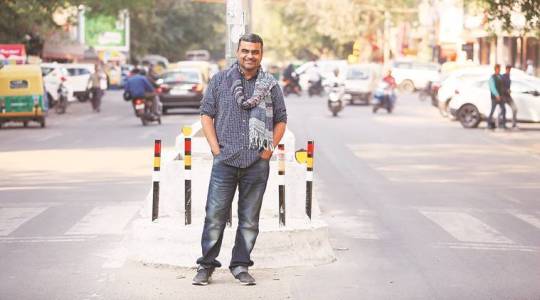
Akhil Katyal
Gender: Male
Sexuality: Gay
DOB: Born 1985
Ethnicity: Indian
Occupation: Poet, translator, scholar, activist, teacher
#Akhil Katyal#lgbt#lgbtq#qpoc#qmoc#male#gay#1985#indian#asian#poc#poet#writer#translator#scholar#activist#teacher
45 notes
·
View notes
Text
I confuse my be with pe.
He asks me to write 'water'
I write 'you'.
Who knew they'd make them so close
Aab (آب) and Aap (آپ).
Both difficult to hold on.
Akhil Katyal, "In The Urdu Class"
1 note
·
View note
Text
poem by Akhil Katyal.
the child in the first frame is Ahmed Al-Najjar, he was 18 months old. the children in the second frame were murdered during the Nuseirat massacre. i do not know their names. i also do not know the name of the little girl in the third frame, nor any of the children in the sixth frame. the man in the last slide was the journalist Salem Abu Tyour, and the little boy was his son.
#free palestine#artists against apartheid#ceasefire#gaza genocide#ceasefire now#free gaza#all eyes on rafah#artists for palestine
2 notes
·
View notes
Text
One of my favourite poets, Jane Hirshfield said, and I’m paraphrasing her from memory – she asks what is the yield of lyric poetry? One of the things that these poets do, she says, is that by being able to respond fully to the range of experiences that the world throws their way, they leave their voice print in the world. Their poetry becomes a stamp of the fact that: “I was here. I lived fully and I experienced all the emotions that humans are capable of.”
– Akhil Katyal with Sayari Debnath for Scroll.in
0 notes
Photo
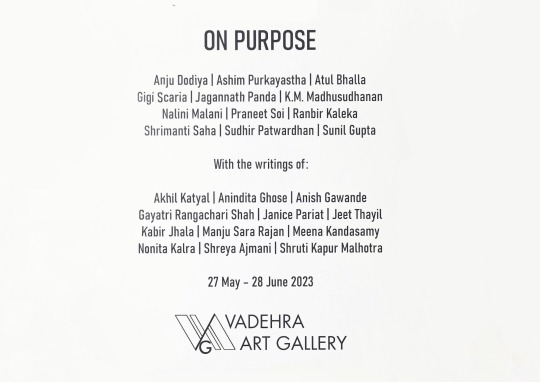
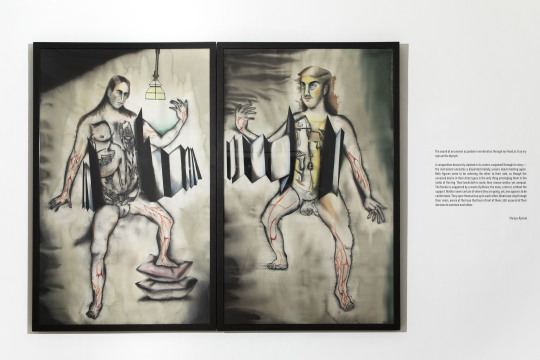
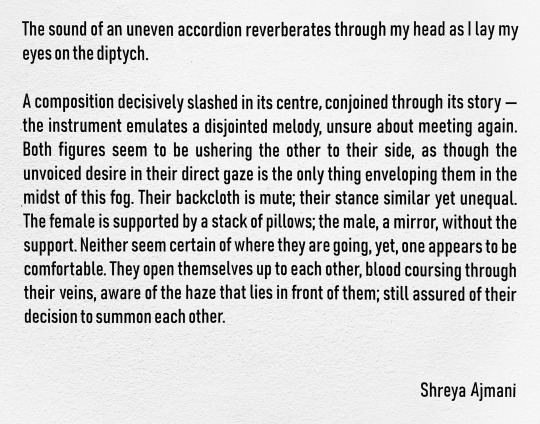
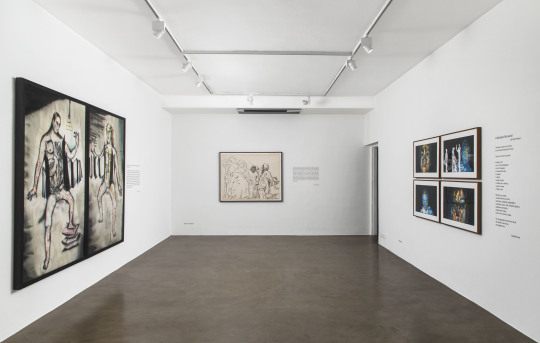
On Purpose
Vadehra Art Gallery
Vadehra Art Gallery is pleased to present a group exhibition by some of the most exciting names in contemporary Indian art and literature. The exhibition includes artists Anju Dodiya, Atul Bhalla, Gigi Scaria, Jagannath Panda, K.M. Madhusudhanan, Praneet Soi, Ranbir Kaleka, Shrimanti Saha, Sudhir Patwardhan, Sunil Gupta, Nalini Malani and Ashim Purkayastha and meaningful contributions by writers Jeet Thayil, Nonita Kalra, Shruti Kapur Malhotra, Meena Kandasamy, Janice Pariat, Manju Sara Rajan, Anindita Ghose, Akhil Katyal, Gayatri Rangachari Shah, Anish Gawande, Kabir Jhala and Shreya Ajmani alongside the powerful works, opening up the discourse of a white-cube space to interdisciplinary interventions.
On display from May 27 to July 10, 2023.
0 notes
Text
by Akhil Katyal
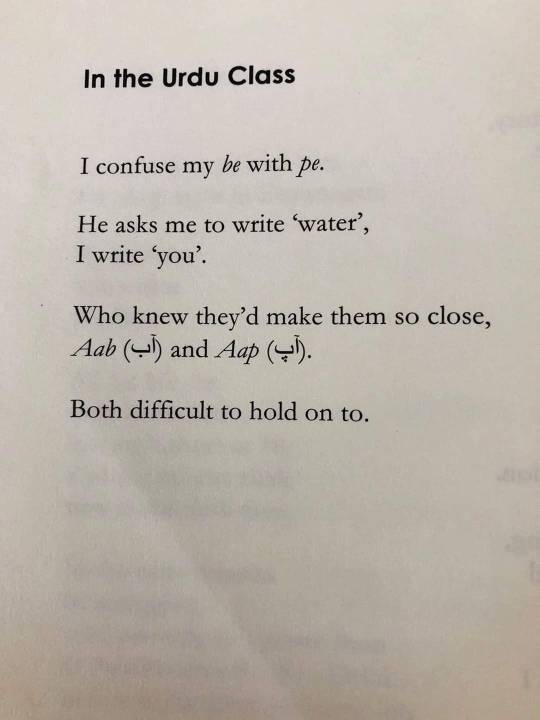
#akhil katyal#urdu#urdu quote#urdu ghazal#urdu literature#urdupoetry#sufi poetry#punjabi poetry#sad poetry#english poetry#poetry#english translation#translate#translation#urdu poems#urdu lines#urduzone#urduposts#hindi poem#hindi#poem#sad poem#original poem#love#lovers#love quotes#love poem#love post#classic urdu#urdu class
6K notes
·
View notes
Text
A Room of Poetry - Akhil Katyal on caste, love and Kashmir
A Room of Poetry – Akhil Katyal on caste, love and Kashmir
In this month’s #ARoomofPoetry, Akhil Katyal is the poet being looked at. Some of you might know him from his column Poetic Licence in The Times of India or his page on Instagram or as the Creative Writing professor at Ambedkar University.
Akhil Katyal – The Delhi Poet

For those of you who might not have heard of him, he is a writer, academic, gay activist and translator. His poetry books…
View On WordPress
#Agha Shahid Ali#Akhil Katyal#Delhi#Featured#Grief#How many countries does the Indus Cross#Kashmir#Loss#Love#Poem#Poetic Licence#Poetry#Simran Arora
0 notes
Note
august and sasha for the web weaves 👁👁?


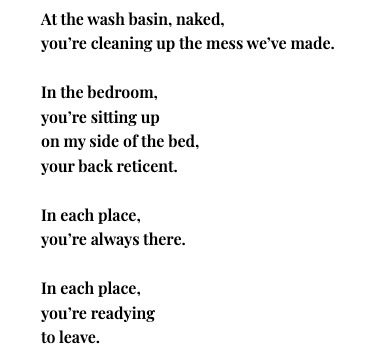

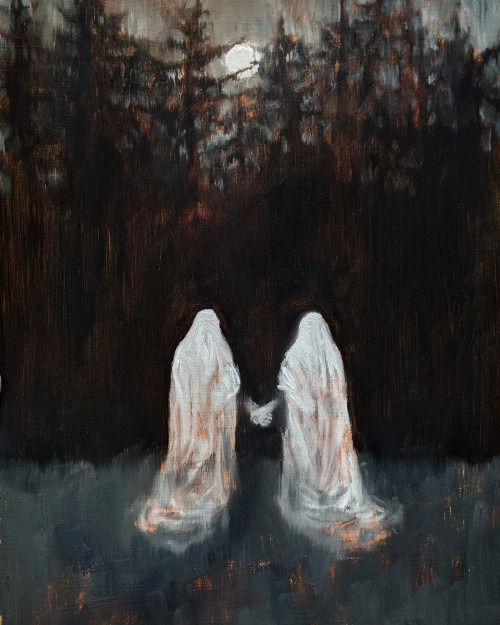
Margaret Atwood / Marina Abramović and Ulay / Katyal Akhil / Jan Heller Levi / Dillon Samuelson
#asks#zyphnn#ewbie weaves#both worked under their respective parent's bs tactics and abuse and were fated to tie back in years down the line because of them#and now you're heart broken and angry but after that all fades youre just two ghosts of yourselves staring at the mess that was left behind#and you cant be mad because whats a victim to another victim but a mirror of themself#their story is sad and doomed from the start and its not even their faults they're just puppets in a greater scheme#i write them later on post tales as close friends bcus i think they'd understand one another really well once the smoke clears#:} shit talk sasha on this post and you will get blocked :} ty danny for this prompt cus it hurts#NOT ROMANCE. DO NOT TAG AS SUCH.
26 notes
·
View notes
Text
‘In the living room
you’re sitting on the landlord’s sofa
tying on your shoe laces.
In the study, I am
pulling you behind the shelves
for one more kiss.
In the kitchen, you’re putting
the three extra spoons of sugar
in your morning tea.
At the wash-basin,
naked, you’re cleaning up
the mess we’ve made.
In the bedroom, you’re
sitting up on my side of the bed,
your back reticent.
In each place
you’re always there.
In each place,
you’re readying
to leave.
-Akhil Katyal, I Come Back To My Flat
#poems#quotes#love quotes#sad quotes#breakup#this poem wrecks me every time the last stanza is a sucker punch
56 notes
·
View notes
Text
I read a lot of really good books from India (and South Asia, generally) in the last year or so, and since they won't get as much attention outside of India, I figured I'd make a list:
[This is an eclectic list which mainly caters to my taste. If you want specific readers on anything particular to Indian political problems, please send me an ask and I'll direct you to readers to the best of my abilities. Please don't take this list as a complete representation of South Asian writing.]
1. Prem Kabootar by Manav Kaul. These are a bunch of short stories written in Hindi - I think there's a translation available, called A Night in the Hills. I was originally drawn to these because I watched a really excellent production at the Shri Ram Centre (this is pre-covid times) of one of the stories, and I decided more recently to read the rest.
2. Ishq Mein Sheher Hona by Ravish Kumar. This is in the same vein as the first one, and again, there's a translation available called The City Happens in Love. I believe it's translated by Akhil Katyal, so I trust it's a good one. This is more of a series of vignettes of people who fall in love in Delhi, and given how much I love Delhi, this one hit me very strongly.
3. When the River Sleeps by Easterine Kire. This book would be a little hard to get into if you're not an Indian reader. The idiom of the writing is different, the rhythm is different - and it's very clear that Kire isn't even catering to Indian mainlanders, let alone people out of India. It's set in Nagaland, a questing story about a man who has to wrench something from the heart of the river. It's laden with magic and history and I really think the author was trying to make you see how wonderful living there is?
4. Bhaunri by Anukriti Upadhyay. I cannot overstate how wonderful this book is. It's set in Rajasthan, deep in the desert, and it's got this dark... edge to it. The heroine marries this man and loves him with all her heart and I cannot actually talk about how the book moves, because it is A Lot.
5. Ghachar Ghochar by Vivek Shanbagh. I know this book misses on some crucial aspects of poverty, such as caste - but it's got such a fascinating picture of family resentments and angers of middle class India. Cannot recommend this enough.
6. Black Hill by Mamang Dai. Okay so this is one of those books in which white men arrive on a land and instinctively your heart sinks because you already know where this story is going. But!! Mamang Dai is really looking at the colonisation that took place in the North East, and even more specifically she's looking at Arunachal. There's a lot less looks into that as compared to the extensive detailing of colonisation in the mainland. It's a lovely book laden with history and that instantaneous foreboding you get when you watch a white man arrive.
7. Those Pricey Thakur Girls and The House That BJ Built by Anuja Chauhan. Okay those were some very intense recommendations, but I promise these two are just cute romances. Both have noncommittal men being completely blown away by firecracker women. Plus it's a multigenerational book series, I love it. I know Chauhan has problems with caste in how much she centres her Rajput pride, but I really love these books.
8. In Now and Then by Revathi Suresh. I was conflicted about adding this, because it is very.................. intense. It's got all this messiness of growing up, with a heroine that's not very likeable (also someone who is definitely uppercaste). I should add that this is the second of a series - Jobless, Clueless, Reckless came first. That one feels like the better book, but this transition is really interesting as well. Oh - trigger warning for suicide. I know that spoils some things, and it's not in the way you expect, but it came out of nowhere for me, so...
9. Power and Print by Anindita Ghosh. This is probably the only nonfiction recommendation in this list, but it's a pretty good book! It's dated and limited to Bengal, but there's very few print histories in India so I enjoyed it.
10. There's Gunpowder in the Air by Manoranjan Byapari. This is a translated text again, the original is in Bengali. It's a jailbreak story that deals with naxalite activists, and I can't emphasise how well written it is. Byapari is also a dalit representative in the current TMC government, which makes his politics even more interesting. I really enjoyed this book, I can't get enough of it.
I read a bunch of bad novels as well, but like I'm going to tell you guys about those. Suffice to say that you should stay away from Once Upon a Curfew by Srishti Chaudhury, and I didn't enjoy Shabnam Minwalla.
#i just want people to gush over some of these books!!!!!!!!!!!!!!!!!!!!!!!#especially black hill and bhaunri. iconic writing#recommendations#hello void this is ridiculosity#book recommendations#south asian writing#indian writing#indian literature#booklr#i talk about books for the hundredth time like its a new thing
68 notes
·
View notes
Text
In the Urdu Class:
I confuse my (ب) be with (پ) pe,
She asks me to write 'water',
I write 'you'.
Who knew they'd make them so close,
Aab (آب) and Aap (آپ).
Both difficult to hold on to.
~Akhil Katyal
- Aab - Water
- Aap - You
4 notes
·
View notes
Text
Wo Kabhi Rahul hai, Raj bhi: Writer Akhil Katyal's viral post reads 'Ek Shah Rukh mein pura Hindustan basta hai'!
Wo Kabhi Rahul hai, Raj bhi: Writer Akhil Katyal’s viral post reads ‘Ek Shah Rukh mein pura Hindustan basta hai’!
New Delhi: Amid high-profile controversy related to Shah Rukh Khan’s son Aryan Khan in cruise party drugs case, the superstar has received immense love pouring in from all walks of life. Some have openly expressed their anger while others have written cryptic posts supporting SRK. Writer Akhil Katyal has penned a few heart-touching lines for Shah Rukh and needless to say that the post has gone…
View On WordPress
#aryan khan#Aryan Khan arrested#aryan khan cruise party#Aryan Khan drugs case#aryan khan jailed#Cruise party drugs case#Gauri Khan#Shah Rukh Khan#srk son#SRK viral post
2 notes
·
View notes
Text
Grief - Akhil Katyal
Grief Is the least biodegradable of objects. Do not bury it. Stash it between your fingers and in those inconsolable hours let it run. There will be nights when even steel dissolves with your touch.
#poem#poetry#poem of the day#poemoftheday#literature#mustread#bookblr#books#reader#reading#quotes#must read#library#writers#writing#author#poems of instagram#poemsofinstagram#read#readers of tumblr#litblr#literatureblr#student#studentblr#studyblr#study#studyinspo#poets#indian poetry#indian writing
4 notes
·
View notes
Photo

Leave a like because it costs nothing🖤 Share this on your stories ✔️ Follow : ( @a.skater.aunty ) For More Amazing Posts ✔️ . . . . . #akhil katyal#urdu#urdu quote#urdu ghazal#urdu literature#urdupoetry#sufi poetry#punjabi poetry#sad poetry#english poetry#poetry#english translation#translate#translation#urdu poems#urdu lines#urduzone#urduposts#hindi poem#hindi#poem#sad poem#original poem#love#lovers#love quotes#love poem#love post#classic urdu#urdu class
1 note
·
View note
Text
Bwana in india crossword

Eliot said to Ted Hughes, “There’s only one way a poet can develop his actual writing - apart from self-criticism & continual practice. In this anthology we see two poems by Vinod Kumar Shukla, a Hindi poet, translated by Mehrotra. And it has been the life’s work of poets like Arvind Krishna Mehrotra to translate Hindi and Prakrit poetry into English. We have some fluency in Hindi, we understand the language of our family (in my case Gujarati) and can somewhat comprehend the language of our state (in my case Marathi). At the same time, we are inward looking – for so much great Indian literature is in numerous Indian languages and many of us are multi-lingual. This openness is a fact of our transnational lives. It’s a tongue-in-cheek way of accepting both conqueror and influence, and stating that for the contemporary Indian poet, born in India or not, living there or elsewhere, there is no desire to be part of an exclusive club. On my desk I have sketched a rough map of the world and over India I’ve written “Enter Here, All are Welcome”. For the Indian poet in America, the problem is explored by Sunu Chandy in ‘Shelter-In-Place (2017)’ and by Minal Hajratwala in ‘Decomposition’. As Indian poets writing in English, we know we are a minority, and our readership is small, even as it is growing. Thayil writes, “Indian poetry, wherever its writers are based, should really be seen as one body of work.” So over here we are not going to have debates about traitors or heroes. Now, and perhaps after The Bloodaxe Book of Contemporary Indian Poets (2008) edited by Jeet Thayil, some of the issues have been thrashed out and many of us don’t feel the need to justify the voice of the Indian poet writing in English. In his 1976 poem ‘Missing Person’, Jussawalla wrote: In ‘Father of Mr S’ Vivek Narayanan writes, “Ah but I speak/ your English, wear your pants why/ o why must I feel useless/ amidst your life’s unlikely reach?”Īnd so here I am, at once in two places, excited to bring you new poems from twenty-one poets writing in English, who trace at least some of their experience or heritage to India. When you are at the crossroads, in a port town gifted to the British as dowry for a Portuguese princess, your very nature is to include, bring in, and listen to the world. We read many poets spanning centuries, continents and languages – Jorge Luis Borges, Italo Calvino, Ted Hughes, and Christina Rossetti. The heat eased by the evening in the shade of the stone buildings. We were close to the ocean, the monsoon had left the island by mid-October, and the sea had calmed, no more fish thrown up by thrashing waves onto asphalt. A dozen of us, including Anand Thakore featured here, would gather outdoors in the tropical gardens of the National Center for the Performing Arts, sharing poets we loved. I imagine myself yet again a part of Loquations, a group started by essayist and poet Adil Jussawalla. In Bombay, nine and a half hours ahead of me, it is Tuesday evening. A stag is staring at me, gold antlers against tree bark. I feel like I am being watched and search the undergrowth. Insects buzz and leaf blowers scream over the hum of traffic. Outside my window is the morning forest still green although autumn has arrived. It is a Tuesday in late October in a city in America. AKHIL KATYAL ♦ ANAND THAKORE ♦ ANINDITA SENGUPTA ♦ ARUNDHATHI SUBRAMANIAM ♦ VINOD KUMAR SHUKLA TRANSLATED BY ARVIND KRISHNA MEHROTRA ♦ CP SURENDRAN ♦ DEVASHISH MAKHIJA ♦ ELLEN KOMBIYIL ♦ HOSHANG MERCHANT ♦ KEKI DARUWALLA ♦ MENKA SHIVDASANI ♦ MICHAEL CREIGHTON ♦ MINAL HAJRATWALA ♦ NITOO DAS ♦ RANJANI MURALI ♦ RANJIT HOSKOTE♦ RAVI SHANKAR ♦ SAMPURNA CHATTARJI ♦ SHIKHA MALAVIYA ♦ SUNU CHANDY ♦ VANDANA KHANNA

0 notes
Text
JLF 2022 announces second tranche of speakers
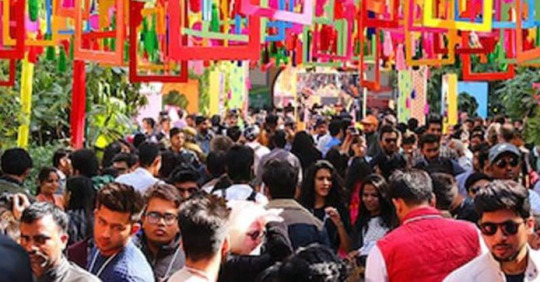
The annual Jaipur Literature Festival (JLF) announced its second list of speakers for the 15th edition, set to take place from28 January to 1 February 2022 in Jaipur. As the just-released list shows, the Festival will once again be a grand marathon of ideas between idealists, realists, visionaries, intellectuals, the avant-garde, and the iconoclasts, who will engage in informed discussion and be united by an abiding love for literature.
The second list of 25 speakers include Indian poet, LGBTQ rights activist, and author of Like Blood on the Bitten Tongue: Delhi Poems and How Many Countries Does the Indus Cross Akhil Katyal; British biographer, literary agent, and author of several book books - including those on the lives of the writer John Buchan, spy Guy Burgess, and Edward VIII - Andrew Lownie; Mumbai-based writer and journalist Anindita Ghose; British archaeologist and author of (co-written with late anthropologist David Graeber) the New York Times bestseller The Dawn of Everything: A New History of Humanity David Wengrow; award-winning British-Turkish novelist and the most widely read woman author in Turkey Elif Shafak; Rajya Sabha MP, Ex-Union Minister and author of several well-known books Jairam Ramesh; Sahitya Akademi Award recipient, renowned poet, writer, critic, playwright, and editor who has written extensively in English and Malayalam K Satchidanandan; PEN Open Book Award-nominated Jamaican poet, writer, and essayist Kei Miller.
Making the list more vibrant, the line-up includes renowned Bangladeshi journalist Mahfuz Anam; critically acclaimed historian and writer of the most recently published False Allies: India’s Maharajahs in the Age of Ravi Varma Manu S Pillai; American academic and author of the award-winning books Edge of Empire, Liberty’s Exiles, and The Dawn Watch: Joseph Conrad in a Global World Maya Jasanoff; British writer of Booker Prize-shortlisted book Brick Lane - Monica Ali; actor, child-rights activist and writer of six children’s books, translated into more than 15 languages globally, Nandana Dev Sen; co-chairman of Forbes Marshall, engineer, businessman, and author of The Struggles and the Promises Naushad D Forbes; feminist, publisher, and writer of the recent ZOHRA! A Biography in Four Acts Ritu Menon; author of internationally bestselling and award-winning books Underland, The Old Ways, Landmarks, and The Lost Words: A Spell Book (with writer Jackie Morris ) - Robert Macfarlane.
Giving it a diverse flavor, the speaker list includes celebrated Hollywood actor, director, and writer Rupert Everett; award-winning British poet, author of 12 poetry collections, two books on wildlife and two novels Ruth Padel; Indian novelist, critic, and academic Saikat Majumdar; Sri Lankan writer of Chinaman: The Legend of Pradeep Mathew which won the Commonwealth Prize, the DSC Prize, the Gratiaen Prize and was adjudged the second greatest cricket book of all time - Shehan Karunatilaka; award-winning Indian film actress, TV personality and author Sonali Bendre; Sahitya Akademi Yuva Puraskar recipient author Tanuj Solanki; author of a range of books that include The Body Adorned, Discourse in Early Buddhist Art and Yogini Cult and Temples and India: A Story Through 100 Objects Padma Bhushan Vidya Dehejia; senior Indian journalist and National Award winning filmmaker Vinod Kapri.
Namita Gokhale, writer, publisher, and co-director of the Jaipur Literature Festival, said, “Our second list of speakers unfurls to provide a further glimpse into the rich diversity of voices to be platformed at Jaipur Literature Festival 2022. We are proud to present writers and thinkers, dreamers and doers, from across languages, cultures, and continents.”
William Dalrymple, writer, historian, and co-director of the JLF, said, “We are coming back with a truly spectacular lineup of literary superstars from across the world. In fiction we have this year’s Booker winner, the great Damon Galgut, his predecessors Monica Ali & DBC Pierre, Pulitzer winner Jonathan Franzen and Turkish superstar Elif Shafak. We have Rob Macfarlane on nature writing, Rupert Everett on Hollywood, Vidya Dehejia on Chola bronzes. We also have a special focus on archaeology and ancient history: Cat Jarman on the Vikings, David Wengrove on the Dawn of Everything and many more.”
Every year, the Festival brings together a diverse mix of the world’s greatest writers, thinkers, humanitarians, politicians, business leaders, sports people, and entertainers on one stage to champion the freedom to express and engage in thoughtful debate and dialogue. The Festival has hosted nearly 5000 speakers & performers and welcomed over a million booklovers from across the world since its inception in 2007. Today, the JLF has grown to become a global literary phenomenon, which is home to riveting conversations, debates, and dialogue.
0 notes